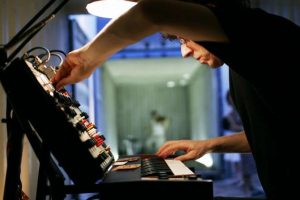
[I herewith kindly ask you to respect the authors rights especially of the interviewed musicians and not to use it without asking our permission. Thanks for your solidarity!]
CLH : „Depuis quand est-ce que tu vis à Vienne?“
ID : „On va dire que depuis six ans et demi, je fais les aller-retour. J’ai plutôt l’impression d’être à Paris et Vienne que d’être à Vienne tout le temps, parce que je voyage beaucoup.“
CLH : „Ok, alors mes questions : Qu’est-ce qui fait la qualité de l’improvisation ? Si tu écoutes, pas si tu joues, mais quand tu écoutes!“
ID : „La personnalité de la musique, déjà sentir l’individualité du musicien, sentir que c’est une musique qui ne peut ressembler à aucune autre parce qu’elle est partie prenante de la personne qui la joue. C’est en même temps son esprit, son corps, sa manière d’être avec un instrument, la manière de penser, la manière de vivre le son. C’est évidemment la forme. J’aime beaucoup quand les improvisations trouvent une forme. Que ça soit pas juste de la matière sonore et que cette structure invisible qui se crée en temps réel, pour moi, ça c’est une manière de permettre de comprendre plus globalement la musique. Parfois dans les improvisations, c’est très riche en matière, c’est très riche en évènement, mais on sent moins la dramaturgie du son ou la dramaturgie invisible, quelque chose qui n’a pas d’histoire vraiment, mais qui va de A à B et ça, c’est pour moi une très grande qualité pour moi. Quand j’écoute, quand je sens qu’on m’emmène quelque part, que le musicien vraiment a la personne, cette personnalité musicale m’a prise avec lui.“
CLH : „Et si c’est un groupe?“

